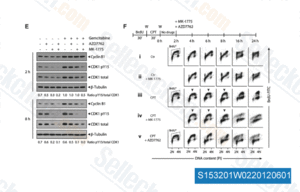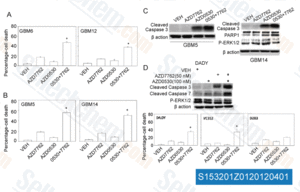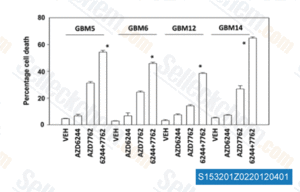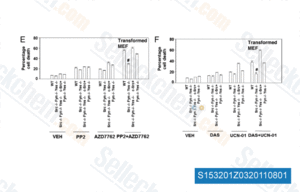|
Toll Free: (877) 796-6397 -- USA and Canada only -- |
Fax: +1-832-582-8590 Orders: +1-832-582-8158 |
Tech Support: +1-832-582-8158 Ext:3 Please provide your Order Number in the email. |
Technical Data
| Formula | C17H19FN4O2S |
|||
| Molecular Weight | 362.42 | CAS No. | 860352-01-8 | |
| Solubility (25°C)* | In vitro | DMSO | 73 mg/mL (201.42 mM) | |
| Water | Insoluble | |||
| Ethanol | Insoluble | |||
|
* <1 mg/ml means slightly soluble or insoluble. * Please note that Selleck tests the solubility of all compounds in-house, and the actual solubility may differ slightly from published values. This is normal and is due to slight batch-to-batch variations. * Room temperature shipping (Stability testing shows this product can be shipped without any cooling measures.) |
||||
Preparing Stock Solutions
Biological Activity
| Description | AZD7762 is a potent and selective inhibitor of Chk1 with IC50 of 5 nM in a cell-free assay. It is equally potent against Chk2 and less potent against CAM, Yes, Fyn, Lyn, Hck and Lck. Phase 1. | ||||
|---|---|---|---|---|---|
| Targets |
|
||||
| In vitro | AZD7762, a more selective Chk1 inhibitor, inhibits Chk1 phosphorylation of a cdc25C peptide by reversibly binding to the ATP-binding site of Chk1, with IC50 of 5 nM and Ki of 3.6 nM. AZD7762 induces cell arrest with EC50 of 0.620 μM, and significantly abrogates the camptothecin induced G2 arrest with an EC50 of 10 nM, by blocking the chk1 dependent degradation of Cdc25A and activation of Cyclin A. AZD7762 (300 nM) enhances the antitumor efficacy of against SW620 and against MDA-MB-231 by reducing the GI50 values from 24.1 nM and 2.25 μM to 1.08 nM and 0.15 μM, respectively. [1] AZD7762 shows cytotoxicity against a variety of neuroblastoma cell lines bearing p53 wild type, p53 mutation, Mdm2 amplification or p14 deletion with IC50 values ranging from 82.6-505.9 nM. [2] |
||||
| In vivo | AZD7762 alone at 25 mg/kg shows little antitumor activity in the H460-DNp53 xenograft mice and SW620 xenograft mice, but when administrated in combination, AZD7762 shows significant antitumor efficacy in the two xenografts mice with a log cell kill of 0.9 or percent treated/control (%T/C) of 26 even at low dose of 12.5 mg. Dosing of AZD7762 in combination in the H460-DNp53 xenograft rat inhibits the tumor volume in a dose-dependent manner with the %T/C values of 48 and 32 for 10 and 20 mg/kg AZD7762, respectively. AZD7762 (25 mg/kg) in combination causes complete tumor regression in the SW620 xenograft mice with the %T/C increasing significantly to -66% and -67%, respectively. [1] |
Protocol (from reference)
| Kinase Assay: |
|
|---|---|
| Cell Assay: |
|
| Animal Study: |
|
Customer Product Validation

-
Data from [Cancer Discov, 2012, 2, 524-39]

-
Data from [Cancer Biol Ther, 2012, 13]

-
Data from [Cancer Biol Ther, 2012, 13]

-
Data from [Cancer Biol Ther, 2011, 12, 215-28]
Selleck's AZD7762 has been cited by 133 publications
| The MYCN oncoprotein is an RNA-binding accessory factor of the nuclear exosome targeting complex [ Mol Cell, 2024, S1097-2765(24)00285-5] | PubMed: 38703770 |
| Natural pentacyclic triterpenoid from Pristimerin sensitizes p53-deficient tumor to PARP inhibitor by ubiquitination of Chk1 [ Pharmacol Res, 2024, 201:107091] | PubMed: 38316371 |
| ELK3 destabilization by speckle-type POZ protein suppresses prostate cancer progression and docetaxel resistance [ Cell Death Dis, 2024, 15(4):274] | PubMed: 38632244 |
| Loss of POLE3-POLE4 unleashes replicative gap accumulation upon treatment with PARP inhibitors [ Cell Rep, 2024, 43(5):114205] | PubMed: 38753485 |
| Crispr-mediated genome editing reveals a preponderance of non-oncogene addictions as targetable vulnerabilities in pleural mesothelioma [ Lung Cancer, 2024, 197:107986] | PubMed: 39383772 |
| Multiplex single-cell chemical genomics reveals the kinase dependence of the response to targeted therapy [ Cell Genom, 2024, 4(2):100487] | PubMed: 38278156 |
| Multiplexed kinase interactome profiling quantifies cellular network activity and plasticity [ Mol Cell, 2023, 83(5):803-818.e8] | PubMed: 36736316 |
| Actionable loss of SLF2 drives B-cell lymphomagenesis and impairs the DNA damage response [ EMBO Mol Med, 2023, e16431.] | PubMed: 37485814 |
| BRD7 suppresses tumor chemosensitivity to CHK1 inhibitors by inhibiting USP1-mediated deubiquitination of CHK1 [ Cell Death Discov, 2023, 9(1):313] | PubMed: 37626049 |
| Selective ATM inhibition augments radiation-induced inflammatory signaling and cancer cell death [ Aging (Albany NY), 2023, 15(2):492-512] | PubMed: 36656721 |
RETURN POLICY
Selleck Chemical’s Unconditional Return Policy ensures a smooth online shopping experience for our customers. If you are in any way unsatisfied with your purchase, you may return any item(s) within 7 days of receiving it. In the event of product quality issues, either protocol related or product related problems, you may return any item(s) within 365 days from the original purchase date. Please follow the instructions below when returning products.
SHIPPING AND STORAGE
Selleck products are transported at room temperature. If you receive the product at room temperature, please rest assured, the Selleck Quality Inspection Department has conducted experiments to verify that the normal temperature placement of one month will not affect the biological activity of powder products. After collecting, please store the product according to the requirements described in the datasheet. Most Selleck products are stable under the recommended conditions.
NOT FOR HUMAN, VETERINARY DIAGNOSTIC OR THERAPEUTIC USE.
